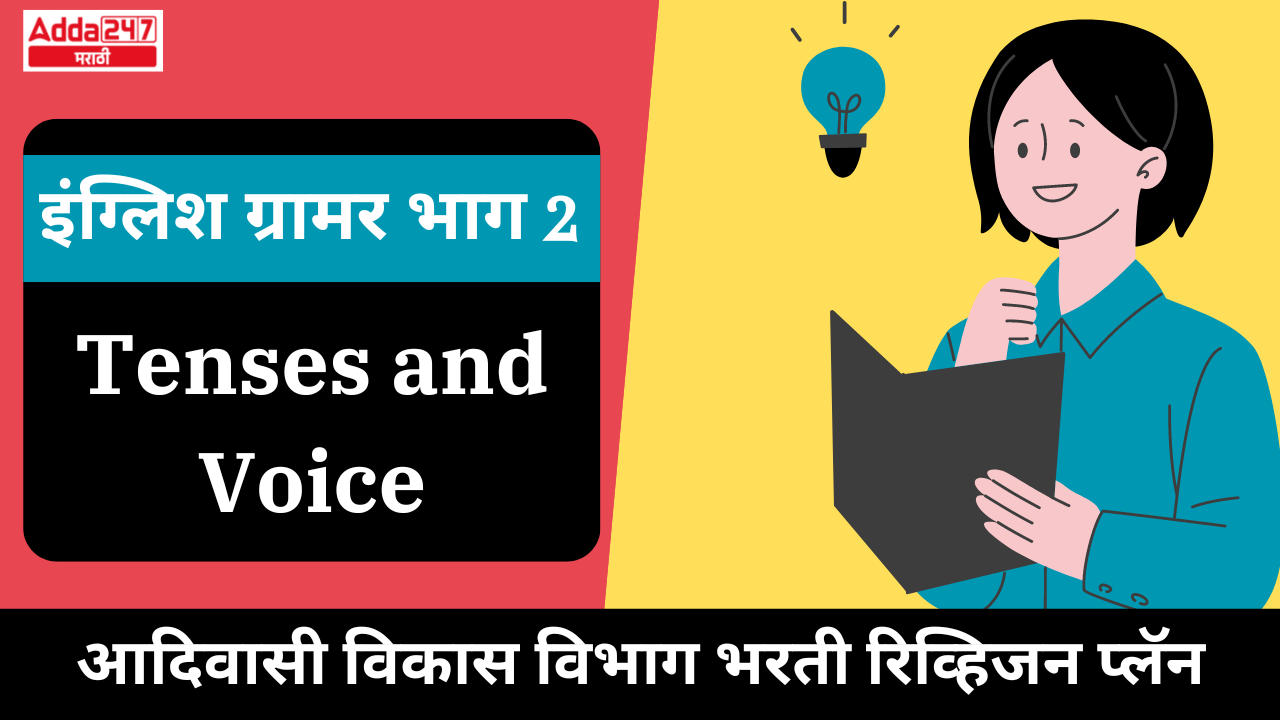Table of Contents
Tense and Types of Tenses
Types of Tenses with Structural Formula
तक्त्यात S- Subject, O- Object, V1- क्रियापदाचे पहिले रूप, V2- क्रियापदाचे दुसरे रूप, V3- क्रियापदाचे तिसरे रूप, Ving म्हणजे V+ing (eat+ing=eating) असे घ्यावे.
| Tenses | Simple | Continuous | Perfect | Perfect Continuous |
| Present | S+V1+O | S+ am/is/are+ Ving+ O | S+ have/has + V3+ O | S+ have/has + been+ Ving+ O |
| Past | S+V2+O | S+ was/were + Ving+ O | S+ had + V3+ O | S+ had + been+ Ving+ O |
| Future | S+ shall/will + V1+O | S+ shall/will + be+ Ving +O | S+ shall/will + have+ V3 + O | S+ shall/will + have+ been + Ving + O |
खालील तक्त्यात Signal words, Use, Form, Affirmative, Negative, Interrogative वाक्य दिलेले आहेत.
| Tense | Signal words | Use | Form | Example affirmative | Examples negative | Examples interrogative |
| Simple Present | Everyday Sometimes Always Often Usually Seldom Never First …. then |
Something that happens Repeatedly how often Follow another things in general with the Follow verbs (to love, to ) Hate, to think etc. |
Infinitive he/she/it + -s |
I work. He works. I go. He goes. |
I don’t work. He doesn’t work. I don’t go. He doesn’t go. |
Do I work? Does he work? Do I go? Does he go? |
| Present Progressive | now at the moment Look! Listen! |
Something is happening at the same time of speaking or around it Future meaning: when you have already decided and arranged to do it (a fixed plan, date) |
To be (am /are/ is) + Infinitive + ing . | I’m working. He’s working. I’m going. He’s going. |
I’m not working. He isn’t working. I’m not going. He isn’t going. |
Am I working? Is he working? Am I going? Is he going? |
| Tense | Signal words | Use | Form | Example affirmative | Examples negative | Examples interrogative |
| Simple Past |
Last… … ago in 1990 |
The action took place in the past, mostly connected with an expression of time (no connection to the present) | Regular : Infinitive + – ed Irregular: 2. Spalte |
I worked. He worked. I went. |
I didn’t work. He didn’t work. I didn’t go. |
Did I work? Did he work ? Did I go? |
| Yesterday | He went. | He didn’t go. | Did he go? | |||
| Past Progressive | While | An action happened in the middle of another action. Someone was doing something at a certain time (in the past) – you don’t know whether it was finished or not |
Was / were + infinitive + – ing | I was working. He was working. I was working. He was going. |
I wasn’t working. He wasn’t working. I wasn’t going. He wasn’t going. |
Was I working? Was he working? Was I going? Was he going? |
| Tense | Signal words | Use | Form | Example affirmative | Examples negative | Examples interrogative |
| Simple Present Perfect | Just yet Never ever Already so far, up to now, For recently |
You say that, has happened or is finished in the past and it has a connection to the present The action started in the past and continues up to the present. |
Have / has + past participle* (infinitive + -ed) or (3rd column of the table of irregular verbs) |
I have worked. He has worked. I have gone. He has gone. |
I haven’t worked. He hasn’t worked. I haven’t gone. He hasn’t gone. |
Have I worked? Has he worked? Have I gone? Has he gone? |
| Present Perfect Progressive |
All-day The whole day How long Since For |
The action began in the past and has just stopped How long the action has been happening Emphasis: length of time of an action |
Have / has + been + infinitive + -ing. | I have been working. He has been working. I have been going. He has been working. |
I haven’t been working. He hasn’t been working. I haven’t been going. He hasn’t been going. |
Have I been working? Has he been working? Have I been going? Has he been going? |
| Tense | Signal words | Use | Form | Example affirmative | Examples negative | Examples interrogative |
| Simple past perfect | Already just never |
Mostly when two actions in a story are related to each other: the action which has already happened is put into past perfect, the other action into simple past The past of the present perfect |
Had + past participle* *(infinitive + -ed) or (3rd column of the table of the irregular verb) |
I had worked. He had worked. I had gone. He had gone. |
I hadn’t worked. He hadn’t worked. I hadn’t gone. He hadn’t gone. |
Had I worked? Had he worked? Had I gone? Had he gone? |
| Past Perfect Progressive | How long since for |
How long something had been happening before something else happened | Had + been + Infinitive + ing | I had been working. He had been working. I had been going. He had been going. |
I hadn’t been working. H hadn’t been working. I hadn’t been going. He hadn’t been going. |
Had I been working? Had he been working? Had I been going? Had he been going? |
| Tense | Signal words | Use | Form | Example affirmative | Examples negative | Examples interrogative |
| Will – future | Predictions about the future (you think that sth will happen) You decided to do sth. spontaneously at the time of speaking, you haven’t made the main clause in type I of the if clauses |
Will + infinitive | I’ll work. He’ll work. I’ll go. He’ll go. |
I won’t work. He won’t work. I won’t go. He won’t go. |
Will I work? Will he work? Will I go? Will he go? |
|
| Going to – future | When you have already decided to do. In the future What do you think will happen |
Be (am / are / is) + going to + Infinitive | I’m going to work. He’s going to work. I’m going to go. He’s going to go. |
I’m not going to work. He’s not going to work. I’m not going to go. He’s not going to go. |
Am I going to work? Is he going to work? Am I going to go? Am I going to go? Is he going to go? |
| Tense | Signal words | Use | Form | Example affirmative | Examples negative | Examples interrogative |
| Future progressive | An action will be in progress at a certain time in the future. This action has begun before a certain time. Something happens because it normally happens. |
Will + be + infinitive + ing. | I’ll be working. He’ll be working. I’ll be going. He’ll be going. |
I won’t be working. He won’t be working. I won’t be going. He won’t be going. |
Will I be working? Will he be working? Will I be going? Will be going? |
|
| Future perfect simple | Sth will already have happened before a certain time in the future | Will + have + past participle* *(infinitive + -ed) or (3rd column of the table of irregular verbs) |
I’ll have worked. He’ll have worked. I’ll have gone. He’ll have gone. |
I won’t have worked. He won’t have worked. I won’t have gone. He won’t have gone. |
Will I have worked? Will he have worked? Will I have gone? Will he have gone? |
| Tense | Signal words | Use | Form | Example affirmative | Examples negative | Examples interrogative |
| Future perfect progressive | Sth. will already have happened before a certain time in the future Emphasis: length of time of an action |
Will + have + been + infinitive + ing | I’ll have been working. He’ll have been working. I’ll have been going. He’ll have been going |
I won’t have been working. He won’t have been working. I won’t have been going. He won’t have been going. |
Will I have been working? Will he have been working? Will I have been working? Will he have been working? |
|
| Condition Simple | Sth. that might happen Main clause in type II of the If clause. |
Would + infinitive | I would work. He would work. I would go. He would go. |
I wouldn’t work. He wouldn’t work. I wouldn’t go. He wouldn’t go. |
Would I work? Would he work? Would I work? Would he work? |
|
| Conditional progressive | Sth. that might happen Emphasis: length of time of an action |
Would + be + infinitive + ing. | I would be working. He would be working. I would be going. He would be going. |
I wouldn’t be working. He wouldn’t be working. I wouldn’t be going. He wouldn’t be going |
Would I be working? Would he be working? Would I be going? Would he be going? |
| Tense | Signal words | Use | Form | Example affirmative | Examples negative | Examples interrogative |
| Conditional Perfect | Sth that might have happened in the past (it’s too late now) Main clause in type III of the if-clauses. |
Would + have + past participle* *(infinitive + -ed ) or (3rd column of the table of irregular verbs) |
I would have worked. He would have worked. I would have gone. He would have gone. |
I wouldn’t have worked. He wouldn’t have worked. I wouldn’t have gone. He wouldn’t have gone |
Would I have worked? Would he have worked? Would I have gone? Would he have gone? |
|
| Conditional Perfect Progressive | Sth. that might have happened in the past (It’s too late now.) Emphasis: length of time of an action |
Would + have + been + infinitive + ing | I would have been working. He would have been going. I would have been going. He would have been going. |
I wouldn’t have been working. He wouldn’t have been going. I wouldn’t have been going. He wouldn’t have been going. |
Would I have been working?
Would he have been working? Would I have been going? Would he have been going? |
Voice
कर्च्यामाच्या संबंधात एखाद्या विषयाची क्रिया दोन प्रकारे व्यक्त होते. एखाद्या विषयाची क्रिया व्यक्त करण्याचे हे दोन मार्ग Voice म्हणून ओळखले जातात.
Voice, in grammar, is a form of a verb indicating the relation between the participants in a narrated event (subject, object) and the event itself.
A transitive verb has two forms or two voices. These are the Active and Passive.
Active Voice (कर्तरी प्रयोग): या वाक्यात कर्ता (Subject) महत्वाचा असून वाक्याची सुरवात कर्त्याने होते. examples. He played cricket.
Passive Voice (कर्मणी प्रयोग): या वाक्यात कर्म (Object) महत्वाचा असून वाक्याची सुरवात कर्माने होते.
Changing the voice from Active to Passive: Active Voice चे Passive Voice करतांना काही नियम आहे ते खालीलप्रमाणे
Rule No.1:
The structure of the sentence will be reversed in passive voice. The places of the subject and the object will interchange. The subject will shift to the place of the object and the object will take the place of the subject in Passive Voice.
Example:
Active Voice: he buys a camera.
Passive Voice: A camera is bought by him.
Rule No.2:
Only past participle form or 3rd form of the verb (.e.g. eaten etc.) will always be used as the main verb in Passive voices for all tenses. No other form of the verb will be used as the main verb.
Rule No.3:
The word “by” will be used before the subject in the passive voice.
Example:
Active Voice: She drinks water.
Passive Voice: Water is drunk by her.
Rule No.4:
Other words such as “with “or “to” may also be used instead of the word “by “depending upon the subject of the sentence. These words are used in a very few cases.
Example:
Active Voice: I know him.
Passive Voice: He is known to me.
Active Voice: Water fills a tub.
Passive Voice: A tub is filled with water.
Rule No.5:
The auxiliary verb will be changed in Passive Voice depending upon the tense of the sentence in its Active Voice.
Rule No.6:
Subject may not always mention in Passive Voice. Passive voice for some sentences can also be written without having a subject if it gives a clear idea about the subject.
Example:
Passive Voice: Women are not treated as equals.
Passive Voice: Sugar is sold in kilograms.
Active Voice चे Passive Voice करतांना काळामध्ये कसा बदल होतो ते खाली तक्त्यात दिले आहे. उदाहरणासाठी Keep या क्रियापद कसे बदलेल ते सांगितले आहे.
| Tense | Active | Passive |
| Simple Present | Keep | Is Kept |
| Present Continuous | Is Keeping | Is Being Kept |
| Simple Past | Kept | Was Kept |
| Past Continuous | Was Keeping | Was being Kept |
| Present Perfect | Have Kept | Have Been Kept |
| Past perfect | Had Kept | Had Been Kept |
| Simple Future | Will Keep | Will Be Kept |
| Conditional Present | Would Keep | Would-Be Kept |
| Conditional Past | Would Have Kept | Would Have Been Kept |
| Present Infinitive | To Keep | To Be Kept |
| Perfect Infinitive | To Have Kept | To Have Been Kept |
| Present Participle | Keeping | Being Kept |
| Perfect Participle | Having Kept | Having Been Kept |
महाराष्ट्रातील सर्व स्पर्धा परीक्षांसाठी ऑनलाईन क्लास, व्हिडिओ कोर्स, टेस्ट सिरीज, पुस्तके आणि इतर अभ्यास साहित्य खाली दिलेल्या लिंक वर क्लिक करून मिळावा.









